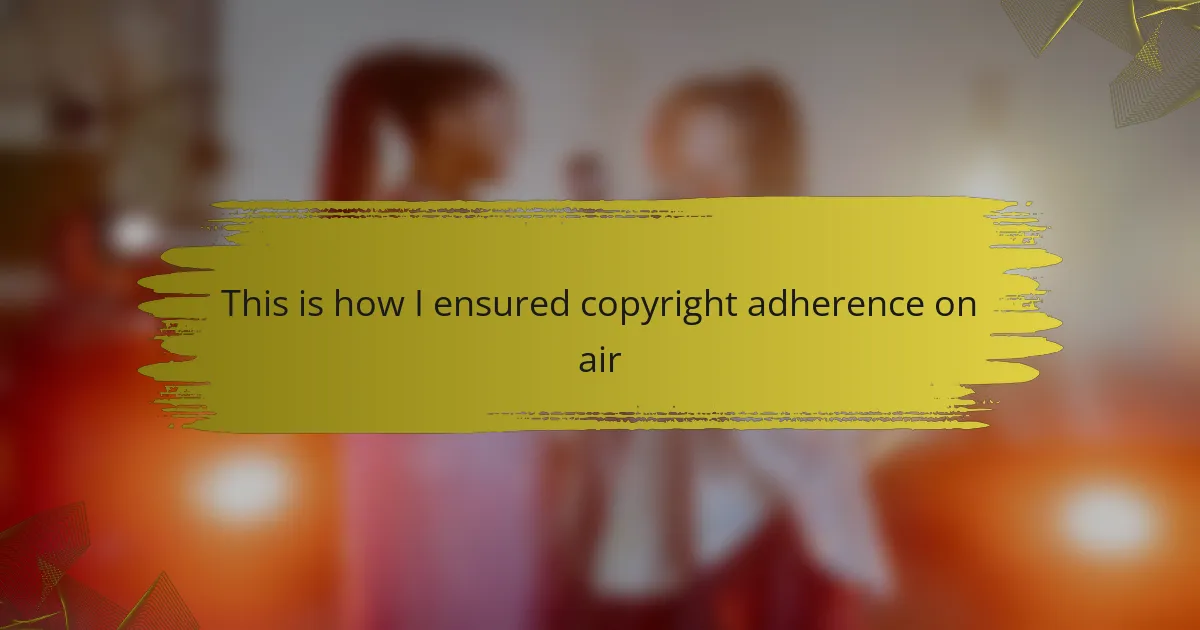Key takeaways
- Understanding and adhering to copyright protects creators’ rights and fosters trust within the artistic community.
- Maintaining a detailed catalog of licenses and permissions is crucial for compliance and avoids legal issues.
- Engaging directly with local artists through collaborations enhances community ties and supports diverse talent.
- Utilizing digital tools like DRM software and license management platforms streamlines copyright management effectively.
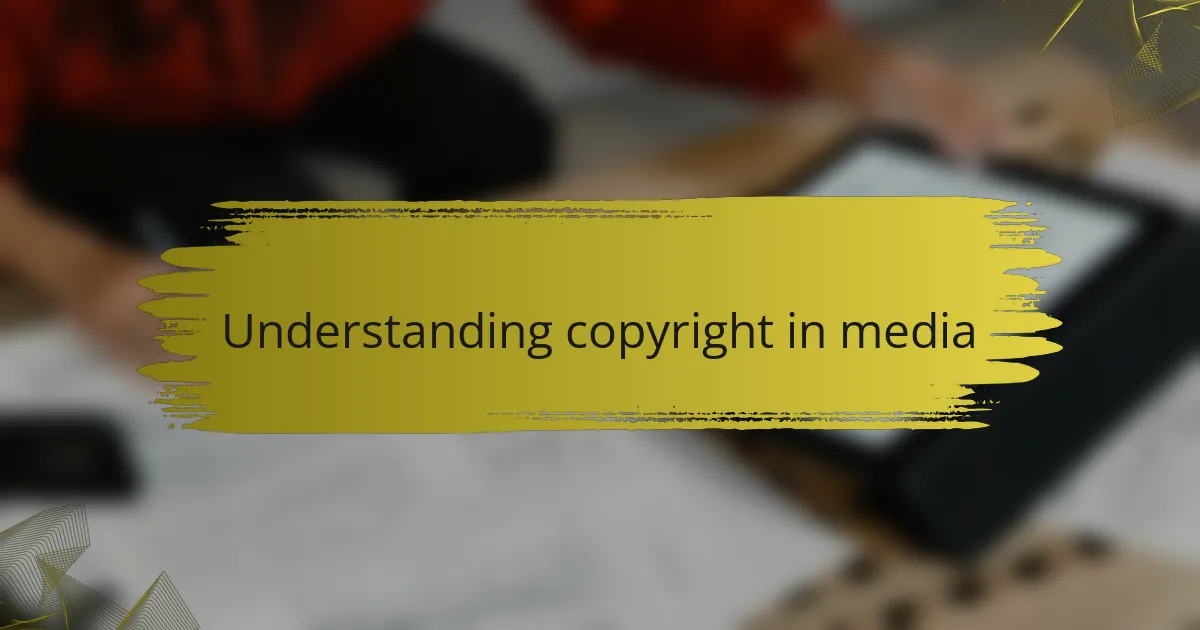
Understanding copyright in media
Copyright is a crucial aspect of media, especially in independent radio. When I first started my journey in broadcasting, I realized how easy it was to inadvertently infringe on someone’s rights. The moment I played a popular song without permission, it hit me—artists put their heart and soul into their work, and understanding copyright is essential to respect that effort and creativity.
Over the years, I’ve learned to be diligent about copyright compliance. It not only protects content creators, but it also enhances the credibility of my station. Here are some key points that I’ve found valuable in grasping copyright in media:
- Copyright grants legal rights to creators, making it illegal to use their work without explicit permission.
- There are different types of licenses, such as Creative Commons, which can provide flexibility in using certain materials.
- Fair Use allows limited use of copyrighted material for purposes like commentary or education, but it often requires a nuanced understanding.
- Always keep a record of permissions and licenses to avoid any unexpected legal challenges.
- Understanding your audience is important; playing original content can foster a more genuine connection with listeners.
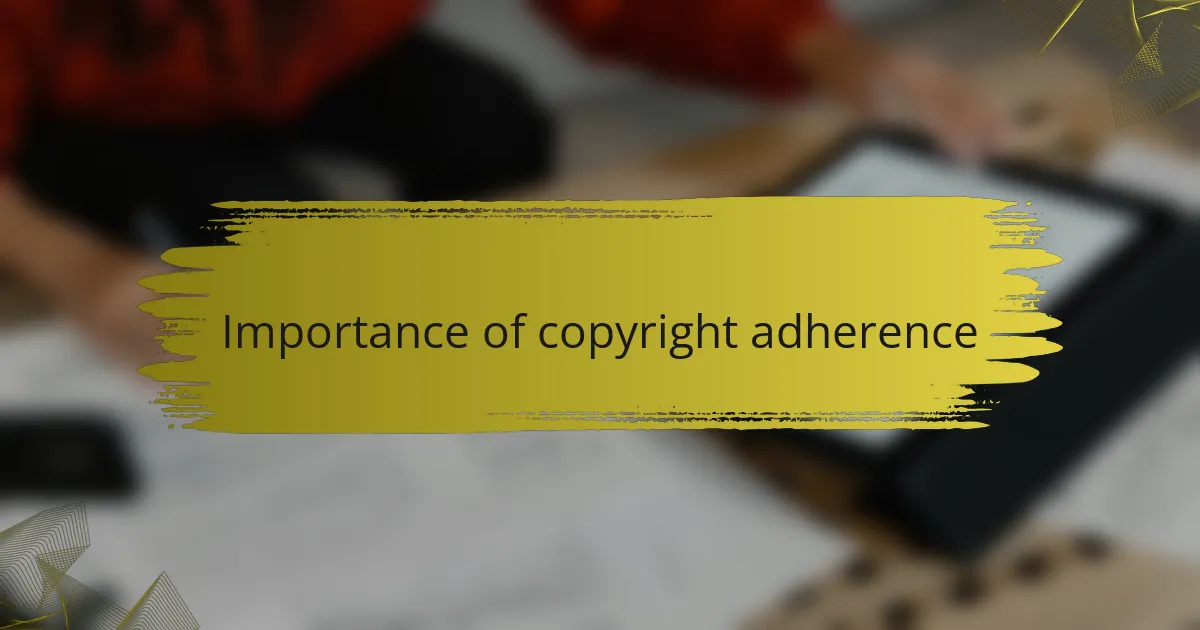
Importance of copyright adherence
Copyright adherence is crucial in independent radio media. From my experience, respecting copyright not only fosters creativity but also builds trust with artists and creators. I remember a time when we played an independent musician’s track without proper clearance. When they reached out, not only did we feel embarrassed, but it also cemented my belief that respect for creators’ rights is foundational for our industry.
Understanding copyright isn’t just about avoiding legal trouble; it’s about supporting the artistic community. Engaging with creatives inspires a vibrant media landscape where everyone thrives. Here are some key reasons why copyright adherence matters:
- It protects the rights and efforts of creators.
- It strengthens relationships with artists and record labels.
- It avoids costly legal disputes that can affect your station’s reputation.
- It fosters a culture of respect and integrity within the industry.
- It encourages the discovery and promotion of new, diverse talent.
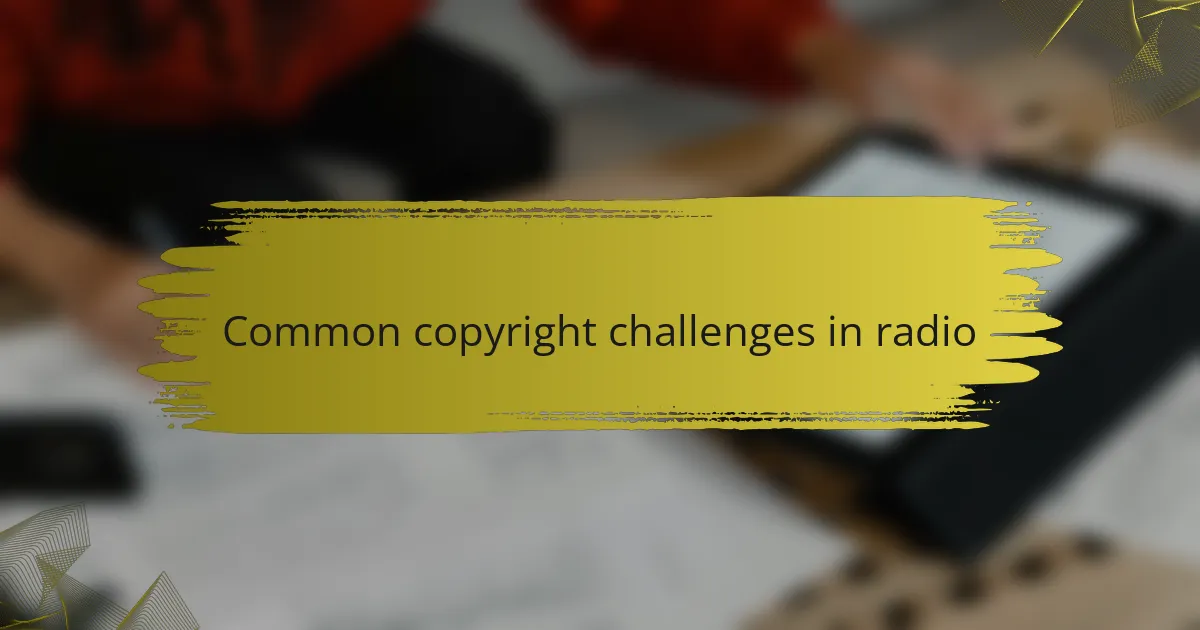
Common copyright challenges in radio
Navigating copyright challenges in radio can be surprisingly tricky. One common issue I’ve encountered is using snippets of songs for commentary or critique, which might seem harmless but easily veers into infringement territory. I recall a particular instance where I thought I could play a catchy clip for a segment—only to later learn that what I assumed was “Fair Use” didn’t apply as clearly as I had hoped.
Another challenge arises when sourcing content from the internet. While many assume that online media is fair game, I’ve found that it’s essential to verify licensing before using any audio clips or interviews. There was a time when I shared an engaging interview without securing permission, thinking it was permissible. That experience reminded me just how critical it is to educate myself on the various licenses available, such as Creative Commons, to empower my choices respectfully and legally.
Lastly, I believe that understanding copyright helps create a more inclusive platform. In the past, we invited local artists to showcase their music, and this not only supported them but also broadened our station’s appeal. It challenges me to think: what are we doing to honor and uplift those voices? That question fuels my commitment to navigating copyright carefully and fostering genuine connections in the radio community.
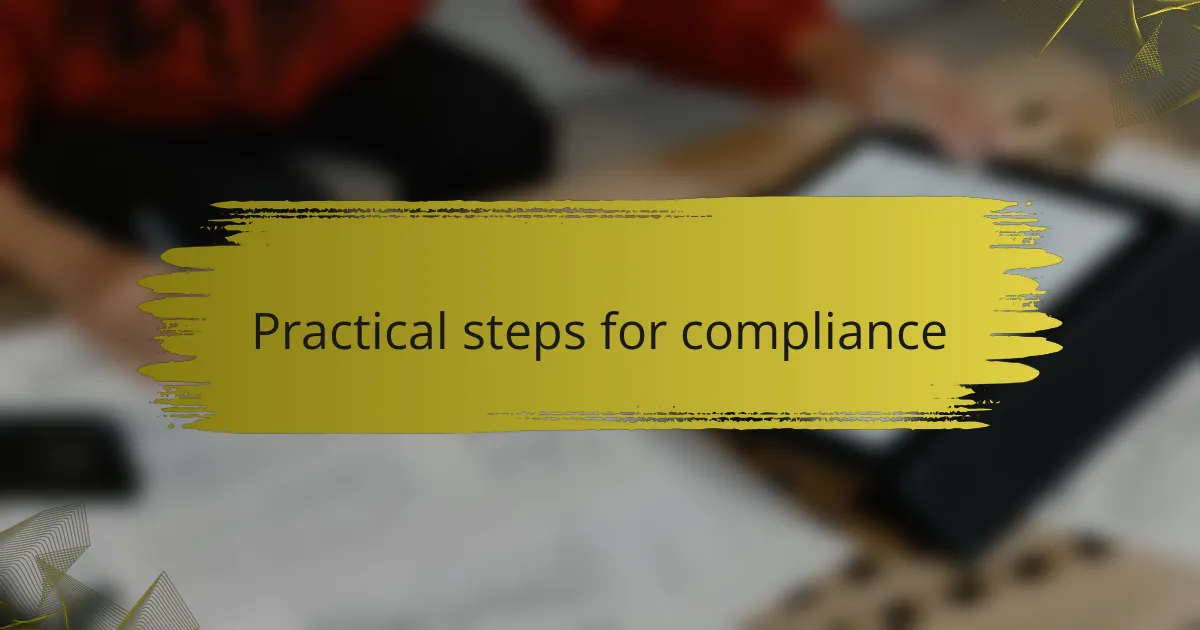
Practical steps for compliance
Ensuring copyright adherence in independent radio is crucial, and I’ve found that practical steps make all the difference. One effective approach I implemented was to maintain a meticulous catalog of all music and content used on-air. This helped me track licenses and permissions more efficiently, giving me peace of mind while broadcasting.
In my experience, collaborating with local artists and creators not only enhances content but also fosters a sense of community and accountability. By directly engaging with them, I gained insights into intellectual property rights, which further solidified my commitment to compliance.
Here are some practical steps to consider for copyright adherence:
- Create and maintain an inventory of all broadcast materials, including music, sound bites, and scripts.
- Obtain written permission for any copyrighted content you plan to use.
- Stay informed about copyright laws specific to your region and industry.
- Consider licensing music through authorized services to ensure compliance.
- Regularly review and update your copyright policy and educate your team about its importance.
- Engage with content creators directly to develop collaborative relationships while respecting their rights.
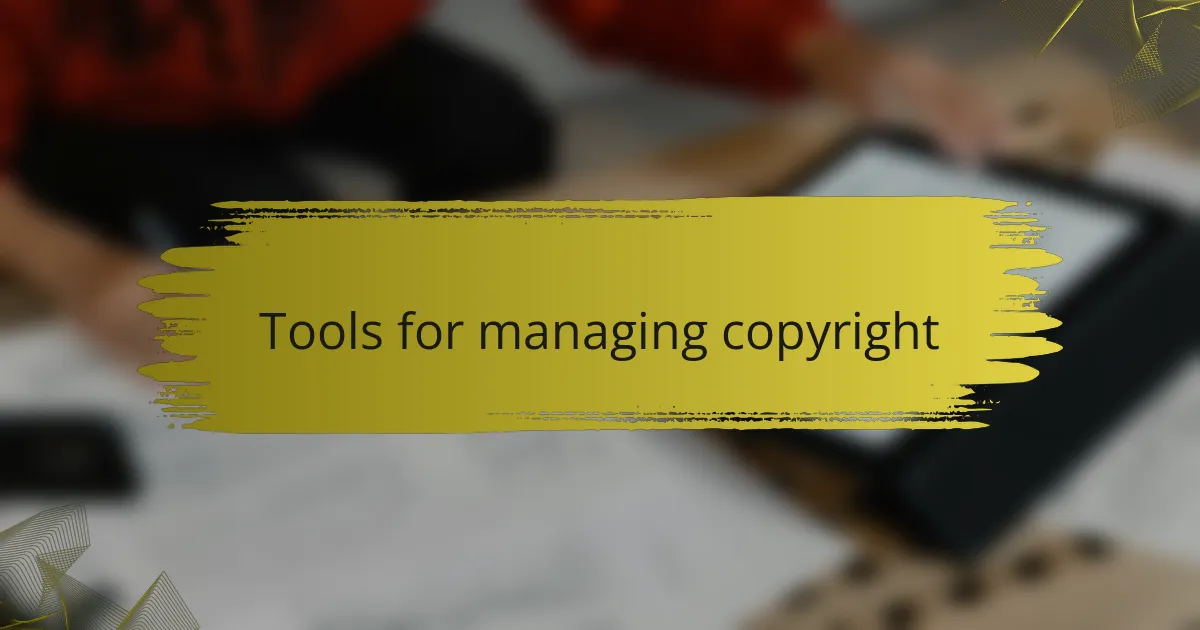
Tools for managing copyright
Managing copyright in independent radio is crucial, especially when your station thrives on diverse content. From my experience, utilizing the right tools can make this task less daunting. For instance, I started using digital rights management software that helps to track licenses and usage, which gave me peace of mind knowing I’m compliant.
Here are some key tools that have helped me navigate copyright adherence effectively:
- Digital Rights Management (DRM) Software: Helps to “lock” your content while tracking usage rights.
- Content Identification Systems: Tools like Audible Magic can help detect copyrighted material played on air.
- License Management Platforms: Services that summarize and manage your license agreements in one place.
- Copyright Education Resources: Websites and organizations that provide insight into copyright laws and best practices.
- Creative Commons Licensing: A way to find music and content that is explicitly free to use, which has been a game changer for our programming.
Using these resources has not only safeguarded my station but has also enriched our programming with the right ethical foundation.
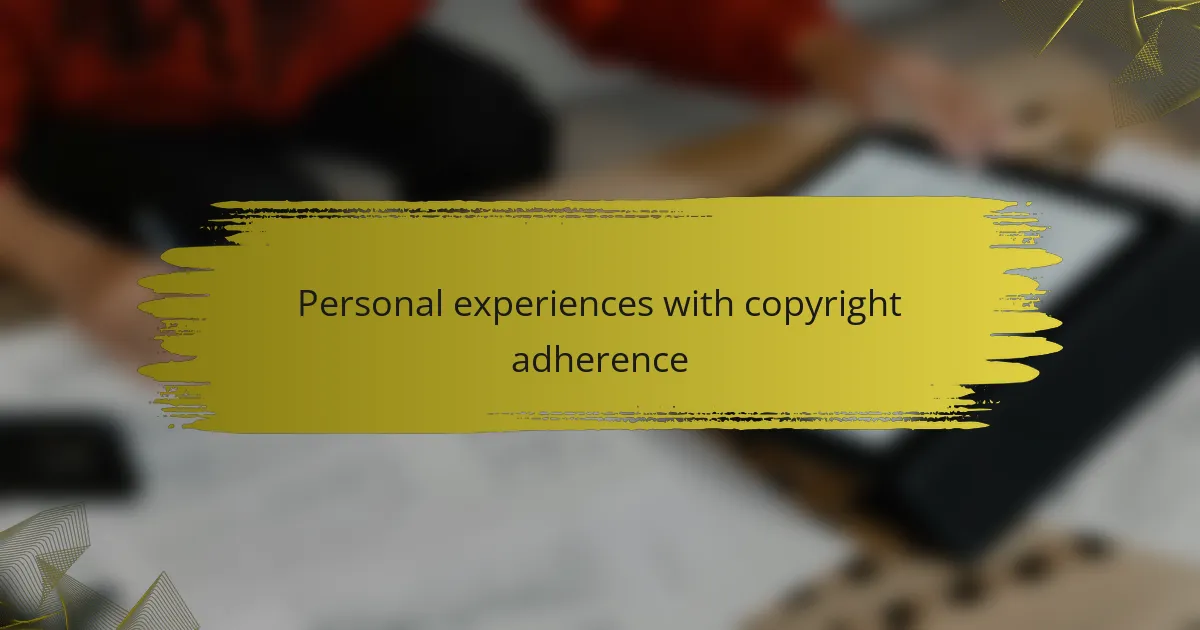
Personal experiences with copyright adherence
Navigating the complexities of copyright adherence has shaped my journey in radio significantly. I vividly recall a moment during my early broadcasts when I played a friend’s track without securing the necessary permissions. The look of surprise and disappointment on their face when they called me out was a wake-up call. It made me realize that maintaining a good relationship with artists is paramount. After that, I never hesitated to clarify permissions beforehand, understanding that it’s not just about legalities, but respect.
As I delved deeper into copyright laws, I came across the concept of Fair Use, which I initially thought would give me more flexibility. However, I learned the hard way that the nuances of Fair Use are often far more complicated than they appear. For instance, I once used a brief audio clip for commentary purposes, thinking it fell under Fair Use—but I was mistaken. This misstep not only caused unnecessary tension but also reinforced my determination to educate myself continuously about copyright regulations.
Engaging with local artists has also enhanced my understanding of copyright adherence. I remember a collaboration with an indie band where they generously shared their music under a Creative Commons license. This experience illuminated the beauty of creating ethical partnerships and respecting creators’ rights in a way that benefits everyone involved. It raised a question in me: How can we, as radio hosts, further promote and protect the artists we love? This ongoing inquiry drives my commitment to uphold copyright standards, fostering a community that thrives on mutual respect and ethical practices.
